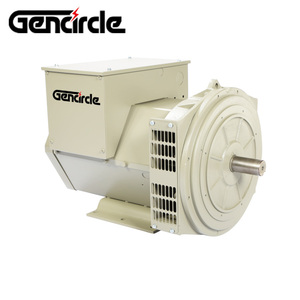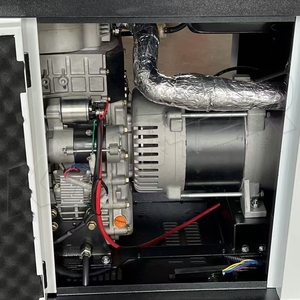(25805 products available)






















































































































































































An alternator 110v is a device that converts mechanical energy into electrical energy using alternating current. The 110-volt alternator is often used in small machines like lathes and milling machines. This is because the 110-volt alternator is safer and reduces the risk of electric shock. There are different types of 110V alternators, including:
Alternator 110v one-wire:
The 110-volt one-wire alternator is popular in classic cars. This is because it is simple and has a single connection to the battery. It also has a self-exciting feature that makes it ideal for engines with no distributors or ignition switches.
110v 3-phase alternator:
Most industrial and commercial applications use the 110v 3-phase alternator. This is because it offers a constant and reliable power supply. This alternator is suitable for heavy lifting and has a more stable output compared to other alternators.
110v portable alternator:
This is a lightweight and compact alternator. The 110v portable alternator is useful for providing power in remote locations and is mainly used in construction and outdoor activities. Despite being portable, it can generate a high power output.
110v Brushless Alternator:
This is the most maintenance-free 110v alternator. The 110v brushless alternator is designed with a rotating magnetic field that reduces wear and tear. This alternator has a longer lifespan, making it reliable for critical applications. The 110v brushless alternator is mainly used in hospitals and data centers.
Alternator 110v specifications vary depending on the intended use. They all have one thing in common, and that is the purpose of use. The following are some of the specifications one might consider before buying;
Power Output
Alternators generate power measured in amps or kilowatts. The power output needs to match the required running power and stand-by power for the devices connected to the alternator.
Voltage Regulation
Voltage regulation is essential because it ensures that the output voltage remains stable. This stability is important for sensitive electrical equipment. Voltage regulation can be done using automatic regulation or digital control.
Frequency
Alternators operate at either 50Hz or 60Hz frequency, depending on the country. The frequency needs to match the required frequency for the connected equipment to operate.
Cooling System
An alternator's cooling system prevents overheating. The cooling system can be air, water, or oil-based, depending on the alternator's design and the generator set's size.
Noise Level
Noise level is an important specification where quiet operation is vital. The alternator's design and the noise level can be reduced using soundproofing.
Size and Weight
Size and weight are important when portability is required. The alternator needs to be lightweight and compact. This can be achieved through modern design and technology.
Maintaining the 110 volt alternator helps prevent unexpected breakdowns and increases its lifespan. Here are a few maintenance tips;
Regular Inspection
Inspect the 110v generator alternator regularly to check for wear and tear. Also, ensure all the parts are working as they should. Pay attention to the belts, bearings, and brushes.
Keep it Clean
Ensure the alternator is clean. Dirt and debris can cause wear and tear on the moving parts and, in turn, affect the alternator's performance.
Lubrication
Lubricate all the moving parts of the alternator, such as bearings and fans, using the manufacturer's recommended lubricant. This reduces friction and prevents wear and tear.
Replace Worn Parts
Replace any worn-out parts of the alternator immediately. Neglecting to do this will prevent the alternator from functioning properly and may cause damage to other parts of the alternator.
Follow Manufacturer's Instructions
Always maintain and use the alternator according to the manufacturer's instructions. This ensures the alternator's reliability and optimal performance.
Choosing the right 110v alternator for specific needs can be a daunting task. But, it doesn't have to be. Here are some key factors to consider when selecting a 110v alternator:
Power Requirements
Consider the total wattage of all devices that need to be powered. This should be the running wattage and the surge wattage (which is higher and lasts a short time) that the alternator needs to handle.
Output Power
When selecting a 110-volt alternator, output power is a crucial factor to consider. Make sure the alternator has enough power output to handle the constant and peak power requirements of the connected loads. Select an alternator with a higher power rating than what is needed to ensure it runs smoothly and doesn't get overloaded.
Frequency Stability
Consider an alternator with a stable frequency and voltage output to avoid damaging sensitive electronic equipment.
Portability
Consider the weight and size of the alternator and any features that enhance portability, such as handles or wheels.
Fuel Efficiency
Consider how much fuel the alternator will use. A more fuel-efficient model will save money in the long run. Also, think about how long the alternator will run on a tank of gas or how many hours it will last on fuel.
Noise Level
Consider the alternator's noise level; some are quieter than others. If noise is a concern, look for a model specifically designed to run quietly.
Warranty and Support
Consider the warranty's length and the alternator's manufacturer's customer service. A good warranty and support can give peace of mind and help if there are any problems.
Replacing a 110v car alternator is a straightforward process that can be done at home by anyone with basic mechanical skills. Here is a step-by-step guide;
Q1: Can a car run without an alternator?
A1: No, a car cannot run without an alternator. The alternator is a vital component of the car's electrical system. It charges the battery and powers the electrical system while the engine runs. Without a functioning alternator, the car's battery would drain, and the electrical systems would be powerless within a short time.
Q2: What is the difference between a 12v and a 110v alternator?
A2: The main difference between a 12v and a 110v alternator is the output voltage. A 12v alternator generates 12 volts of electrical power and is commonly used in most cars and small vehicles. On the other hand, a 110v alternator produces 110 volts of electrical power, which is primarily used in industrial and agricultural machinery for powering larger electrical systems and equipment.
Q3: How long does an alternator last?
A3: An alternator can last anywhere between 80,000 to 200,000 miles. However, its lifespan depends on various factors, such as driving conditions, the quality of the alternator, and the maintenance of the vehicle.
Q4: What are the signs of a faulty alternator?
A4: The signs of a faulty alternator include a warning light on the dashboard, dim or flickering lights, difficulty starting the car, strange noises like grinding or squealing from the alternator, electrical power issues, and a smell like burning rubber or plastic.
Q5: Can the alternator be repaired?
A5: Yes, but it's not cost-effective. The alternator can be repaired, but alternator repairs are rare and often expensive. Replacing the alternator with a new or refurbished one is usually more cost-effective and practical than repairing it.